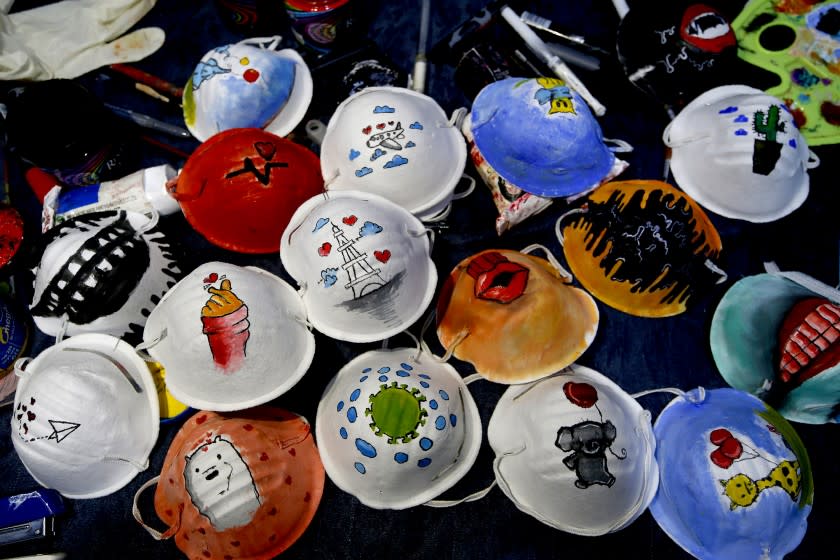Op-Ed: As a hospice chaplain, I can only ask: Why aren't you wearing a mask?

He came into the Orange County hospital because he had trouble breathing.
A week later the sign “caution droplets” hung on his ICU room door.
“Droplets,” code for COVID-19.
He hasn’t been conscious for 36 hours.
Only the ventilator keeps him alive.
Together, the doctor, hospice social worker and I tell the family nothing more can be done.
They nod, they have no fight left.
The doctor hates that he cannot save this man.
But he can allow them to say goodbye.
He tells them they can go in groups of two for 10 minutes.
He leaves us. He has to help someone else.
He cares for two floors of people with COVID-19, 51 people in all.
We tell them this is special, the doctor hasn’t allowed this before.
They mumble thanks. Translation: Isn’t that generous of you.
I stand outside the window into his room. When the 10 minutes are up, I wave.
His family members' eyes plead, two fingers in the air, two minutes?
They smile and laugh in his room in case he can sense them.
But they sob once they slide shut his door.
The final two are his wife and first-born.
She collapses when she reaches his bed.
Their son barely catches her.
She kisses her husband, whispers in his ear.
I hope he senses her near him.
They don’t look at me when they walk away.
While hospital staffers extract the breathing tube
the social worker and I wait outside his room
because microscopic COVID-19 droplets will release into the air.
Once the tube is removed we prepare to enter his room.
We don’t have to go in, but we do. Mostly for him,
but for the staffers as well. They should have support too.
We sanitize our hands, then don gloves.
Then the N95 mask,
hairnet,
face shield,
then gown.
It’s uncomfortable, but it’s also keeping us alive.
Probably.
The staffers inspect us.
They are the best of humankind.
I ask if co-workers have had the virus.
Sure, they say. They point to the ones who recovered and are back working.
I don’t ask if any co-workers died. They have to focus on now.
Staffers adjust his medications.
He won’t feel the removal of the tube.
His family had asked if they could FaceTime
after the tube is removed.
The social worker holds up the phone.
I hold the patient’s hand. We hear his family:
“We love you, be at peace, go with God.”
The social worker is used to being around the dying, but this is different.
Ten minutes is not long enough to say goodbye.
She’s young, this is her first pandemic.
She was a child when people with AIDS died every day for years.
I was there, I was 25.
There wasn’t enough time then either.
We all watch the monitor, the lines become flatter.
We hear his last breath. Then nothing.
The nurse nods to us.
The social worker tells the family that he’s gone to be with God.
I don’t have her faith.
I don’t know where he’s going except to the morgue.
His relatives are wailing. We try to say how sorry we are, but they’ve hung up.
Does anyone else feel like they’ve just witnessed an execution?
We slide the door open, just enough to get out.
There is a receptacle for the shield and the hairnet.
I put my N95 into a plastic bag to leave out in the sun at home.
There aren’t enough of these masks to have a new one every time, but the nurse says, “It’s OK.
Just put it in the sun, the virus dies in the sun.”
I hope she’s right.
COVID-19 is disproportionately killing Black and brown people.
I’ve heard people speculate: Didn’t they all have lung issues,
or diabetes, or health problems that
made them more likely to get infected and die?
That sounds a lot like: Didn’t gays and IV drug users bring AIDS on themselves?
Disposable populations.
Outside the hospital there is a billboard.
“HEROES WORK HERE.” I want to scream.
Hero is just another word for better you than me.
The social worker calls me the next morning. She couldn’t sleep.
“This was bad,” she says with a sigh, “I’ll see you at the hospital soon.”
And now the memory comes back full force.
Caring for the next person, and the next one.
I’m worried about myself and feeling guilty for even thinking about myself.
I’m worried I’ll forget that balance is important.
Forty years later, there is still the next one and the next one.
So tell me: Why aren’t you wearing a mask?
Fran Chalin has been a hospice chaplain for more than 10 years.
